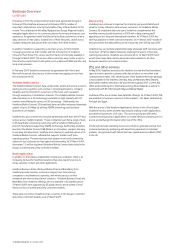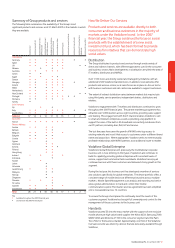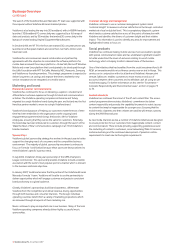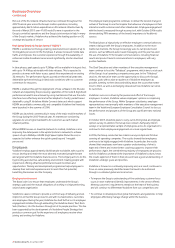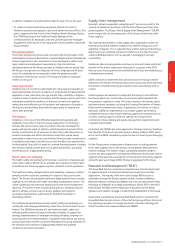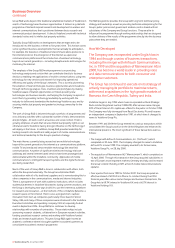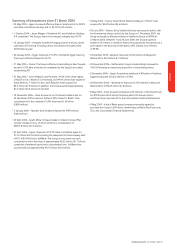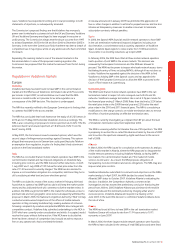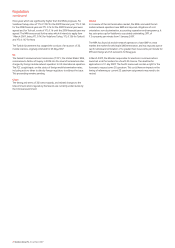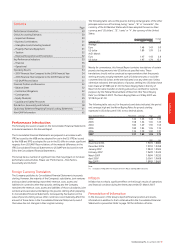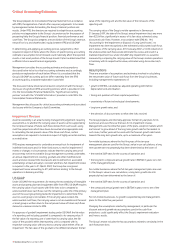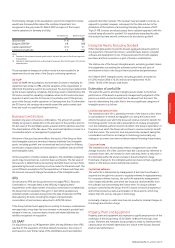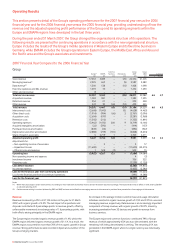Vodafone 2007 Annual Report Download - page 26
Download and view the complete annual report
Please find page 26 of the 2007 Vodafone annual report below. You can navigate through the pages in the report by either clicking on the pages listed below, or by using the keyword search tool below to find specific information within the annual report.24 Vodafone Group Plc Annual Report 2007
The Group’s operating companies are generally subject
to regulation governing the operation of their business
activities. Such regulation typically takes the form of
industry-specific law and regulation covering
telecommunications services and general competition
(anti-trust) law applicable to all activities. Some
regulation implements commitments made by
Governments under the Basic Telecommunications
Accord of the World Trade Organisation to facilitate
market entry and establish regulatory frameworks.
The following section describes the regulatory
framework and the key regulatory developments in the
EU and selected countries in which the Group has
significant interests. Many of the regulatory
developments reported in the following section involve
ongoing proceedings or consideration of potential
proceedings that have not reached a conclusion.
Accordingly, the Group is unable to attach a specific
level of financial risk to the Group’s performance from
such matters.
European Union
Although all Member States of the EU (“Member States”) have now
implemented the EU Regulatory Framework for the communications sector
(“the EU Framework”), which was adopted in 2002, there remain both
ongoing and new infringement proceedings against a number of Member
States for late or inadequate implementation.
The EU Framework consists of four principal Directives outlining matters
such as the objectives to be pursued by national regulatory authorities
(“NRAs”), the way in which telecommunications operators are to be
licensed, measures to be taken to protect consumers and ensure universal
provision of certain telecommunications services and the terms and basis
upon which operators interconnect and provide access to each other.
The EU Framework seeks to align the techniques for defining where sector
specific regulation may be applied, and the threshold for when such
regulation can be applied, with those already employed in EU competition
law. It is also intended to ensure consistency of approach amongst NRAs
within the Member States. All NRAs are required to take utmost account of a
list of markets which are specified by the European Commission (the
“Commission”) in a Recommendation when deciding which markets to
investigate. The first such Recommendation was published by the
Commission in February 2003 and includes markets at a wholesale level for
‘voice call termination on individual mobile networks’ (the “call termination
market”), the ‘wholesale national market for international roaming’ (the
“roaming market”) and the wholesale market for ‘access and call origination’
(the “access market”) on public mobile networks (together the “relevant
markets”). NRAs may, with the Commission’s consent, also propose markets
not included in the Recommendation.
The Commission is currently reviewing the Framework and the
Recommendation (“the review”) and a revised list of markets is expected to
come into force during 2007. This review may lead to an increase or a
decrease in the number and scope of markets subject to sector specific
regulation. Changes to the Recommendation are expected to become
effective in late 2007 or early 2008, while any changes to the EU Framework
would become effective following their transposition into national law from
around 2010 onwards. The Commission currently proposes changes to the
way spectrum is managed in Europe to increase flexibility, a change to the
institutional framework aimed at greater consistency and harmonisation
and the inclusion of functional separation as a possible regulatory remedy.
The impact of the review will depend on the changes actually adopted by
the EU, the manner in which revised directives are subsequently
implemented in Member States and how the revised regulatory framework
will be applied by the respective NRAs.
Under the EU Framework, regulation can only be applied to undertakings
with significant market power (“SMP”), either individually or collectively, in
the relevant markets, subject to the Commission’s consent. SMP under the
EU Framework accords with the concept of “dominance” under existing EU
competition law. For individual dominance, this generally implies a market
share of at least 40%, although other factors may also be taken into
consideration. The Commission published SMP Guidelines in July 2002,
which set out principles for use by NRAs in the analysis of markets to
determine if undertakings have SMP under the EU Framework.
Spectrum
In February 2007, the Commission published a Communication on its plans
to introduce greater flexibility in the use of spectrum in selected bands,
including 2G and 3G bands, through the use of Decisions agreed with the
Radio Spectrum Committee (an EU level committee comprising the
Commission and Member States). These reforms are expected to take place
in advance of the review, which is proposing full service and technology
neutrality as the general principle in spectrum management, spectrum
trading and greater coordination among Member States. The first proposed
measure is a replacement of the GSM Directive by a decision to allow the
deployment of UMTS services using 900 MHz and 1800 MHz spectrum.
The Commission and the RSPG (“Radio Spectrum Policy Group”) are
analysing the various options for the use of the spectrum that will be
released after the analogue broadcasting switch-off, the so called “digital
dividend”. The Commission has sent a mandate to the European Conference
of Postal and Telecommunications Administrations (“CEPT”) to verify the
technical feasibility of using part of the digital dividend for mobile services.
International Roaming
In February 2006, the Commission proposed new legislation by way of a
regulation (the “roaming regulation”) under Article 95 of the EU Treaty
(which would have immediate effect) to reduce what it considers to be
excessive prices charged by mobile network operators for international
roaming services. These proposals have been amended and adopted by the
European Parliament on 23 May 2007. They are expected to be adopted by
the European Council and Commission in early June 2007, and to come into
force in late June 2007. The regulation adopted by the Parliament requires
mobile operators to offer, within 1 month of the regulation coming into
force, a ‘Euro-tariff’ under which the cost of making calls within the EU is
capped at 49 eurocents and the cost of receiving calls within the EU is
capped at 24 eurocents. Customers who have not otherwise already opted
for another roaming tariff (such as Vodafone Passport) must be
automatically opted onto the Euro-tariff within three months of the
regulation coming into force. The regulation also requires that wholesale
roaming charges within the EU are capped at an average rate of 30
eurocents per minute within 2 months of the regulation coming into force
and that operators provide certain tariff transparency services to customers
when they roam. The level of the retail and wholesale caps will fall further
12 and 24 months following the application of the regulation. The roaming
regulation will terminate after 3 years.
Anti-trust proceedings in relation to international roaming continue. In July
2004, the Commission issued a statement of objections, a document
detailing its proposed findings following its investigation into the UK market
for wholesale international roaming and, in January 2005, the Commission
issued a statement of objections following its investigation of the German
market. In both cases the statement of objections was addressed to both
the national mobile operating subsidiaries and to the Company and, in both
Regulation




